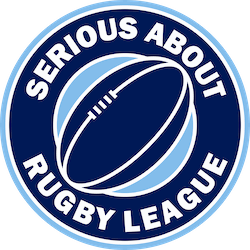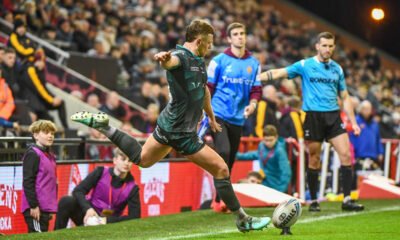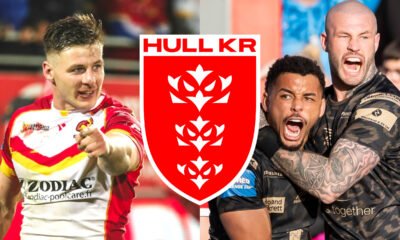
It’s been almost two and half years since Toronto Wolfpack departed the British game following financial difficulties as a result of the Covid-19 pandemic.
Being the first transatlantic sports team was always going to be challenging and the Wolfpack faced heavy criticism throughout their journey up the English league system, making their way from League One to Super League within three years.
Backed by Australian businessman David Argyle, the Wolfpack were able to dominate the lower divisions and in many ways their journey to Super League was a sporting fairytale, but things turned sour once they got there, with the global pandemic the tipping point.
Speaking exclusively to Serious About Rugby League, former stand-off Blake Wallace, who was with the Canadian side throughout their entire existence, has spoken about how the sporting-mad city of Toronto were starting to take to the team.
“We would ride our bikes through the city for training and stuff,” recalled Wallace. “You would cruise through the city and people were starting to recognise us.
“The year we got promoted their was a buzz around the place, it’s one of those where you look at it and think ‘if Covid didn’t hit and we actually got to play a few Super League games over there, how would it have gone?’
“When you get the best teams in England coming over it would have been something pretty special. I honestly think sky is the limit for [rugby league in North America] but unfortunately it didn’t work out that way.”
With big-name signings such as rugby league icon Sonny Bill Williams, Toronto put the Super League on notice when they finally made the top flight in 2020 under the competition’s most successful ever coach Brian McDermott.
Their stay in the top flight was short lived though as they only played six rounds of fixtures before the season was postponed – losing all six league games to end their period bottom of the Super League table.
Wallace believes the club was let down by others during this period, believing that certain clubs went out of their way and looked for any reason possible to get rid of Toronto from the English league system.
“I look at it like ‘what was really put in place to help us be successful?'” said Wallace. “We was swimming against the current and we were on the backfoot straight from the start.
“I definitely think some things could have been put in place to help the club have better success. You talk about growing the game and [Toronto] was an avenue for it.
“The way we rose through the ranks, I think they saw us as a novelty but we got to Super League and everbody started to take notice.
“I think we missed an opportunity. I look at when Catalans first entered the league they was given a couple of years to help get their feet under the table and I wonder if something like could have been put in place.”
From a player point of view, the expulsion of Toronto from the League left a big void for players to fill financial, as they are still yet to receive money owed to them from that period.
“At first we didn’t know when we was going to be back playing as it was unclear, and then the financial issues started hitting us and you start hearing things,” Wallace explained.
“We’re still chasing payment and through that period it was really tough, my wife supported us as a family as I wasn’t getting an income. It was tough for a lot of the boys.”
Wallace moved to Leigh amidst all the uncertainty around Toronto’s future but acknowledges he was one of the lucky ones to find another club as the players were offered very little support.
“We were waiting around for the league to have a vote and it didn’t look like it was going to go our way so I had to make a call. I had to make a decision for me and my family and that’s how I ended up signing with Leigh.
“I was lucky that I had a club show interest and it didn’t work out the way I thought it would either, but that’s footy.”
Although it ended on a sour note, Wallace doesn’t regret his time in Canada and looks back on it with fondness rather than disdain.
“I try to look at all the positives more than the negatives. When I think back to my time in Toronto, I got to wake up and do something I love every day.
“I’ll always be grateful for the opportunity because not many people get to do it and the whole experience in itself was pretty unique.
“It’s something I’ll always hang on to. it ended the way it ended but there’s no point crying over spilt milk.”
And Wallace is also hopeful that Toronto and rugby league in North America can continue to progress, despite the disappointing end to the Wolfpack’s time in Super League.
“I don’t see why it can’t be successful because it has all the foundations in place now,” said Wallace. “I know they already have their own domestic competition and I really think that can grow.
“I remember at the end of the games, kids would run on the pitch at Lamport Stadium and play their own little match and that was a very visual example of the interest that was starting to buidl around the sport.
“These were kids, born in Toronto, coming to watch the Wolfpack and then replicating what they had just seen by wanting to play the game themselves because they enjoyed watching the game.
“Toronto had the crowds, it had plenty of youngsters interested and I think the North American market is something rugby league should continue to target, even if the Wolfpack franchise didn’t exactly have the most ideal ending.
“You can’t forget what went before. This was a newly-formed club getting some of the best attendances in Super League or the Championship, I don’t think the game here can let that go to waste.”




























